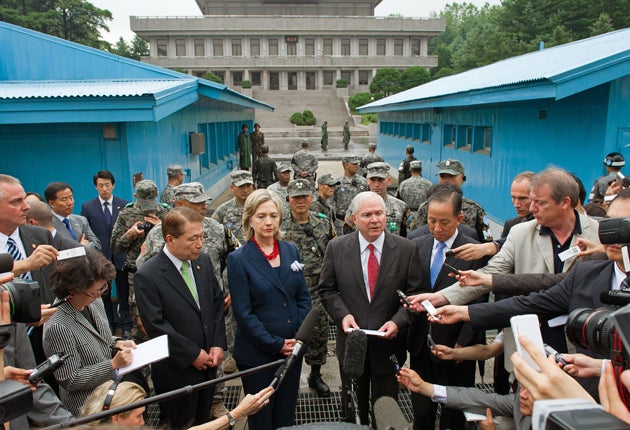US to impose new sanctions on North Korea

The United States today announced new sanctions against North Korea, targeted against its leadership, and warned of serious consequences if it again attacked the South.
Relations across the divided peninsula have turned increasingly hostile after South Korea accused the North of sinking one of its warships in March, killings 46 sailors.
US Secretary of State Hillary Clinton said Washington was ready to return to international talks over North Korea's nuclear weapons programme if Pyongyang sent a "positive signal", but that there had been none so far.
"We are aiming very specifically, after much intensive research built on what was done before but not limited to that, to target the leadership, to target their assets," Clinton told a news conference in Seoul with U.S. Defense Secretary Robert Gates and their South Korean counterparts.
She insisted the additional sanctions were not aimed at ordinary North Koreans, who make up one of the world's poorest societies and whose stumbling economy is already largely sealed off from the outside world because of nuclear and missile tests.
The officials warned of "serious consequences" if there were any future North Korean attacks against the South.
Earlier in the day, Clinton and Gates made an unusual joint visit to the heavily defended demilitarised zone (DMZ) that divides the two Koreas amid a warning the peninsula faced a dangerous new period.
Nearly 2 million troops flank a 4-km (2.5 miles) wide strip of land that has kept the two Koreas apart for nearly 60 years and is one of the last relics of the Cold War.
Clinton said the North could have what it wants - a peace treaty, normal relations with the United States and an end to sanctions - if it ended its belligerence and took irreversible steps to end attempts to build atomic weapons.
"But until they change direction, the United States stands firmly on behalf of the people and the government of the Republic of Korea."
The retired general nominated by US President Barack Obama to be his intelligence chief said on Tuesday that the sinking of the South Korean warship Cheonan may herald a "dangerous new period" of direct attacks by Pyongyang on the South.
The warning by James Clapper at his Senate confirmation hearing for director of national intelligence put a spotlight on growing concern within the U.S. intelligence community and the Pentagon about what they see as the North's increasingly unpredictable behaviour.
Gates earlier announced that joint US and South Korean naval and air exercises would begin next weekend that will include the aircraft carrier USS George Washington and F-22 Raptor aircraft.
The planned exercises have been criticised by North Korea which accused the two allies of using them to prepare for an attack.
China, North Korea's only major ally, has also voiced its unease at the drills in its region and state television on Tuesday showed the Chinese navy conducting its own exercises that included helicopters and a submarine.
Gates called for a resumption of military-to-military ties with China, suspended earlier this year over planned US arms sales to Taiwan.
The concerns coincide with worries about the health of iron ruler Kim Jong-il, who appears to be trying to engineer the succession for his youngest son as leader of one of the world's most isolated countries, which has been pressing ahead with efforts to develop a nuclear arsenal.
North Korea has repeatedly argued that it has no choice but to build a nuclear deterrent in the face of US aggression. Analysts say Kim uses the constant threat of war as justification to focus on maintaining one of the world's largest standing armies while the economy falls into near ruin.
"In the 20 years since I last climbed that observation tower and looked out across the DMZ, it's stunning how little has changed up there and yet how much South Korea continues to grow and prosper," said Gates. "The North, by contrast, stagnates in isolation and deprivation."
Join our commenting forum
Join thought-provoking conversations, follow other Independent readers and see their replies
Comments
Bookmark popover
Removed from bookmarks